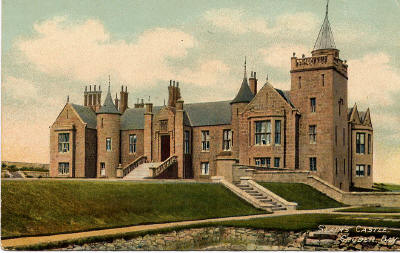|
The first record of the
name Hay, Norman in origin, is William de Haya, Cupbearer of Malcolm IV of Scotland, who
arrived in this country around 1160 and married a Celtic heiress. He was one of the
hostages held in England with William the Lion and on his return was granted an extensive
manor in Erroll. His younger brother Robert was progenitor of the Earls of Tweeddale.
Tradition has it that Thomas the Rhymer prophesied that an oak tree, covered by mistletoe
would fall during a strange Hay ritual which took place every Halloween. When this
prophecy became fact, the estate of Erroll was sold in 1636. The 3rd Baron, Gilbert was
Co-Regent of Scotland, Sir Gilbert the 5th chief featured prominently in the Scottish War
of Independence and was given Slains castle in Buchan and made Hereditary Lord High
Constable of Scotland by Bruce. (A post which the family retains and is the highest
ranking position in Scotland after the Royal family) The 7th chief married the King's
daughter, while William, 9th chief was created Earl of Erroll in 1452. At the Battle of
Flodden in 1513, the 4th Earl, William was killed along with 87 other Hays. In 1594 the
Royal forces under Argyll were defeated by the Earl of Huntly in alliance with the 9th
Earl of Erroll. In revenge King James personally blew up Slains Castle. Sir William Hay of
Delgaty, Montrose's Chief of Staff was beheaded with him in 1650. The 13th Earl, Charles
helped to organise the 1708 Jacobite attempt and was imprisoned after the Rising. His
sister Mary who succeeded him as Countess of Erroll in 1717 raised her clan for Prince
Charles during the '45. The Border branch of the Hays became Lords Hay of Yester in 1488
and are now represented by the 11th Marquis of Tweed-dale.

Slains Castle as it
was in all its glory
|

